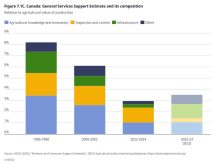With commodity prices soaring and the federal government negotiating with the provinces on a new version of Growing Forward, no one expects agriculture to rate much more than mention in passing in the March 22 budget.
A recent Agriculture Canada forecast predicted generally rosy conditions for most sectors of Canadian agriculture going forward as food prices climb due to shortages. Agriculture Minister Gerry Ritz says he’s watching how the food price situation affects consumers. Canadians are still paying less for food than people in most other countries.
Read Also

Local farm businesses, groups look forward to Manitoba Ag Days 2026
Most of agriculture is seemingly at Manitoba Ag Days each January: Manitoba agribusinesses and farm groups look forward to connecting with farmers at the 2026 show.
As for helping low-income groups, “that becomes complicated because most support programs are operated by the provinces,” he says. “We will keep a watch on what happens down the road.”
The New Democrats have called on the federal government to offer help in the budget to low-income groups to cope with rising food prices.
NDP Farm Critic Alex Atamanenko says the federal government must act quickly to ensure all Canadians have access to adequate amounts of healthy food while enabling farmers to earn a decent living producing quality food.
“There has been a nine per cent increase in food bank use since 2009, 38 per cent of these are children, 11 per cent are working poor, 15 per cent are on some form of disability income support, seven per cent are seniors, and 12 per cent are Aboriginal. Even so, most of the government’s largesse is going to the wealthiest among us,” said Tony Martin, the party’s poverty critic.
He noted Food Banks Canada reports in its HungerCount2010 that 867,948 Canadians sought help from a food bank in 2010. “That’s the highest level of food bank use on record.”
Liberal MP Kirsty Duncan has called for a national school breakfast program. “Canada is the only industrialized country without such a program. If kids are hungry, they can’t learn.” Higher food prices only aggravate the problem.
Ron Bonnett, president of the Canadian Federation of Agriculture, says the average farmer lost money in seven of the 10 years and needs higher prices for livestock, grain, fruits and vegetables to increase output to match the growing demand for food around the world.
The government shouldn’t try to squeeze farmers to get lower food prices, he adds. It should use social programs to help low-income groups.
Liberal farm spokesman Wayne Easter has called for action to reduce the staggering $54-billion debt load Canadian farms are carrying. He also wants Ottawa to ensure farmers will be able to access sufficient credit to plant this years crop so they can cash in on the higher prices.
The Conference Board of Canada has added to the concern about food prices with a report that says the current higher prices will likely become permanent.
“Food is already a big part of family budgets, and recent spikes in prices for agricultural products mean that it will take an even bigger bite out of shoppers’ pocketbooks,” says Michael Burt, the board’s associate director of forecasting and analysis.
“Consumers have grown used to cheap food, as their prices have fallen relative to other products for decades,” he said in a commentary. “No longer. Many of the factors driving prices higher are permanent, and this means that consumers should expect their grocery bill to gobble up an increasing share of their budgets.”
Food accounts for nearly 15 per cent of household expenditures, Burt says, so even modest price changes can have a measurable impact on consumers and their purchasing power.
Burt stopped short of recommending government provide any help to the low-income groups.














